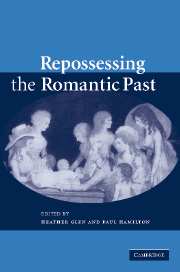Book contents
- Frontmatter
- Contents
- Notes on contributors
- Introduction
- PART I DISSENT AND OPPOSITION
- 1 ‘Severe contentions of friendship’: Barbauld, conversation, and dispute
- 2 Hazlitt's visionary London
- 3 Shelley's republics
- 4 Memoirs of a dutiful niece: Lucy Aikin and literary reputation
- 5 Holding Proteus: William Godwin in his letters
- PART II REOPENING THE CASE OF EDGEWORTH
- PART III DIFFERENT DIRECTIONS
- Marilyn Butler: a bibliography
- Index
1 - ‘Severe contentions of friendship’: Barbauld, conversation, and dispute
Published online by Cambridge University Press: 15 December 2009
- Frontmatter
- Contents
- Notes on contributors
- Introduction
- PART I DISSENT AND OPPOSITION
- 1 ‘Severe contentions of friendship’: Barbauld, conversation, and dispute
- 2 Hazlitt's visionary London
- 3 Shelley's republics
- 4 Memoirs of a dutiful niece: Lucy Aikin and literary reputation
- 5 Holding Proteus: William Godwin in his letters
- PART II REOPENING THE CASE OF EDGEWORTH
- PART III DIFFERENT DIRECTIONS
- Marilyn Butler: a bibliography
- Index
Summary
My title is taken from the following passage in William Blake's epic poem Milton:
Is this our Femin[in]e Portion the Six-fold Miltonic Female
Terribly this Portion trembles before thee O awful Man
Altho' our Human Power can sustain the severe contentions
Of Friendship, our Sexual cannot: but flies into the Ulro.
Hence arose all our terrors in Eternity! & now remembrance
Returns upon us! Are we Contraries O Milton, Thou & I
O Immortal!
This essay is not concerned with Blake directly, but aims to unpick some of the hidden relations behind the hegemonic eighteenth-century idea of the conversation of culture. ‘Conversation’ is a ubiquitous term in eighteenth-century historiography, but there seems to have been little work done on what constituted conversation as what we might term a literary and verbal technology, or how it stood in relation to ideas of controversy and freedom of speech. In Habermas's account, for instance, conversation is the means by which private opinions come to be transformed into the public sphere, but neither he nor his many followers have looked in much detail at what constituted conversation (as opposed to other kinds of discourse) in and for the period. What were the contentious others, I want to ask, against which conversation was defined? Is conversation defined as part of a continuum with contention, dispute, and controversy, or is it seen as part of a binary opposition with such terms?
- Type
- Chapter
- Information
- Repossessing the Romantic Past , pp. 21 - 39Publisher: Cambridge University PressPrint publication year: 2006
- 2
- Cited by

